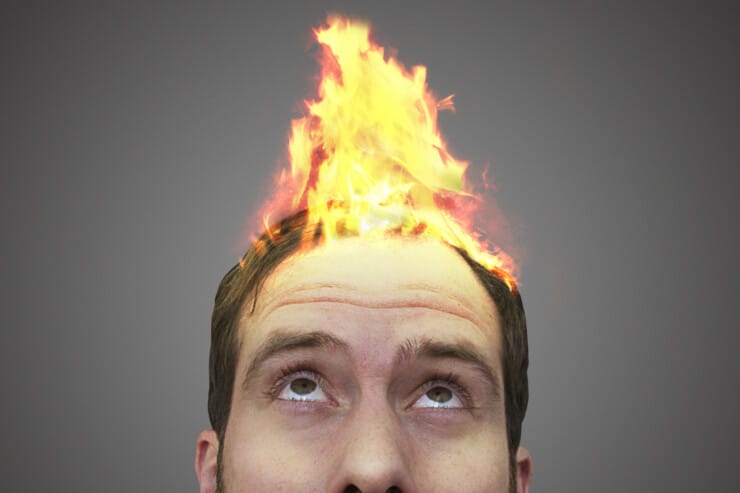Why Is There a Strange Burnt Hair Smell in My House?
The odor of burnt hair can stem from multiple sources, some of which might be harmless, while others could signal underlying issues.
For example, it could be the sign of an electrical problem or an indication of phantosmia, a condition where a person smells something that isn’t actually there, often being unpleasant odors like burnt toast or metallic smells.

Proper identification of the source and understanding the potential risks associated with strange odors in the home are crucial for ensuring our well-being.
In this article, we will share our findings and discuss possible causes for a burnt hair smell in the house, as well as ways to address and resolve the issue.
Possible Causes of Strange Burnt Hair Smell
Electrical Issues
One potential cause for the burnt hair smell in your house could be electrical issues.
If you notice a persistent burnt odor, it’s essential to check for any malfunctioning or overheating electrical devices.
These can range from appliances to wiring and electrical outlets.
A burning smell could indicate that the electrical system needs attention and may pose a risk of fire.
Cooking Accidents
Sometimes, you may accidentally burn food while cooking, which can cause a burnt hair smell in the house.
Furthermore, burnt cooking utensils, oven mitts, or overheating cookware could be contributing to the unpleasant odor.
To minimize the risk of cooking accidents, always stay attentive in the kitchen and use proper cooking techniques and tools.
Heating Appliances
Burnt hair smells might also emanate from heating appliances such as the HVAC system or space heaters.
Dirty air filters can cause the blower motor to overheat, producing an unpleasant burnt smell(source).
To maintain a healthy heating system and prevent odors, make sure to check and replace air filters regularly.
It’s also necessary to ensure that the heating appliances are functioning correctly and safely.
Smoldering Material
Another possible cause for the burnt hair smell in your home could be smoldering or burnt material, like fabric or insulation.
This could be caused by various factors, including a small fire, a dropped cigarette, or objects accidentally placed too close to heating sources.
When you detect a lingering burnt odor, inspect your home for any smoldering materials, and take action to remove them and avoid potential hazards.
Identifying the Source
Visual Inspection
When you first noticed the strange burnt hair smell in the house, the first thing you can do is immediately began a thorough visual inspection.
Start by checking each room, looking for any burnt objects or signs of fire damage.
If there are no visible fire hazards or burns, proceed to examine appliances, which could potentially emit such odors.
Pay close attention to electrical wires, circuits, and outlets, being aware that overheated electrical components could produce a burnt smell (Bob Vila).
Don’t forget to check areas like the heating vents, furnace, and water heater, as these could also be culprits for such odors.
Take note of any unusual findings, such as scorch marks, discoloration, or signs of overheating in these areas.
Using Your Sense of Smell
Don’t forget to use your sense of smell to help pinpoint the source of the burnt hair odor.
Try to sniff carefully around appliances while they were running, such as the dishwasher and washing machine (Today’s Homeowner).
Continued to follow the smell, ensuring to check hidden areas like crawl spaces, basements, and attics for any unwelcome surprises.
Understanding that not all sources of odors are visible, pay close attention to any changes in the intensity of the smell as you move throughout the house.
This can help you narrow down potential locations and provide valuable information to address the issue effectively.
Health Risks and Dangers

Air Quality Concerns
The smell of burnt hair in a house can negatively affect the air quality, possibly leading to respiratory issues over time.
Breathing in these fumes may cause lung irritation and trigger allergies or asthma in sensitive individuals.
It’s essential to identify the cause of the burnt hair odor and address it to maintain a healthy living environment.
Fire Hazards
Another concern when it comes to burnt hair in a house is the potential for fire hazards.
The presence of such a smell could indicate an electrical issue, a malfunctioning appliance, or even an undiscovered fire.
We cannot stress enough the importance of thoroughly investigating and resolving any potential fire hazards, as they can cause severe property damage and pose a significant threat to personal safety.
Maintaining a safe and healthy living environment requires keeping an eye out for potential hazards like these.
Identifying and addressing such issues early on helps prevent more severe problems from arising.
Mitigation and Prevention Strategies
Regular Maintenance
It is very important to regularly maintain your home.
It’s essential to keep the living space clean and tidy to prevent the buildup of contaminants, such as hair and dust.
One effective method is to vacuum the floors and upholstery regularly.
It helps to remove not only dirt but also any lingering hair strands that might be susceptible to burning.
It’s also beneficial to change the furnace or HVAC filter monthly until the smell dissipates, as recommended by CIRES.
Proper Use of Appliances
Using appliances properly is key to preventing burnt hair incidents in the home.
Make sure not to leave any heated devices, such as curling irons or hair straighteners, unattended.
It only takes a few seconds for hair to catch fire if left too close to a hot surface.
When cooking, make sure that you don’t wear clothing with long, loose sleeves, as recommended by familydoctor.org.
This precaution helps minimize the risk of accidentally igniting hair near the stove.
You can also invest in high-quality hair care products, such as the shampoo and conditioner mentioned by L’Oréal Paris, to strengthen and protect your hair from potential damage.
Practice fire safety in your home by ensuring that you have functional smoke alarms and an easily accessible fire extinguisher.
In the case of any emergencies, it’s crucial to have these necessary tools to minimize the risk of a more significant fire happening in your home.
Implementing these mitigation and prevention strategies will not only help reduce the occurrence of burnt hair incidents but also make your home a safer place for everyone.







